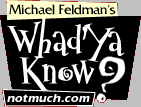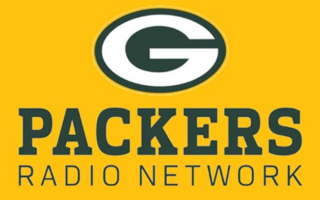Related Research Articles

Whad'Ya Know? is an American comedy, interview, and quiz radio show. Hosted by Michael Feldman, it was created in 1985. During its radio run, it was produced by Wisconsin Public Radio and distributed through Public Radio International. Feldman is accompanied on-stage by Lyle Anderson, phone-answerer; and the Whad'ya Know Trio with John Thulin on piano, Jeff Hamann on bass, and, on road shows, Clyde Stubblefield on drums. Jeffry Eckels was the original full-time bass player from 1987 to 2003. Feldman was also accompanied by Jim Packard as announcer from the show's beginning until his death following the June 9, 2012, show from New York City. Sara Nics was the show's announcer from October 13, 2012 to March 28, 2015. Stephanie Lee became the show's announcer in August 2015. The show was broadcast live with an audience from Monona Terrace in Madison, Wisconsin. Periodically, the show was taken on the road and broadcast from various other locations across the United States. The show was broadcast weekly, each Saturday at 10:00 AM CT (UTC-6) for two hours, and repeated throughout the week by syndication. Since the beginning of 2009, the entire show has also been available over the Internet as a podcast. The show aired its final WPR/PRI radio broadcast on June 25, 2016, with prior episodes archived on the show's website. Starting in the fall of 2016, Whad'ya Know became available as a podcast.

Wisconsin Public Radio (WPR) is a network of 34 public radio stations in the state of Wisconsin. WPR's network is divided into two distinct analog services, the Ideas Network and the NPR News & Music Network, as well as the All Classical Network, a digital-only, full-time classical music service.

WHA is a non-commercial radio station, licensed since 1922 to the University of Wisconsin and located in Madison, Wisconsin. It serves as the flagship for the Wisconsin Public Radio talk-based "Ideas Network". WHA's programming is also broadcast by two low-powered FM translators, and by WERN FM's HD3 digital subchannel. The station airs a schedule of news and talk programs from Wisconsin Public Radio, NPR, American Public Media, Public Radio International, the Canadian Broadcasting Corporation and the BBC.
A book discussion club is a group of people who meet to discuss a book or books that they have read and express their opinions, likes, dislikes, etc. It is more often called simply a book club, a term that is also used to describe a book sales club, which can cause confusion. Other frequently used terms to describe a book discussion club include reading group, book group, and book discussion group. Book discussion clubs may meet in private homes, libraries, bookstores, online forums, pubs, and in cafés or restaurants over meals or drinks.
A radio reading service or reading service for the blind is a public service of many universities, community groups and public radio stations, where a narrator reads books, newspapers and magazines aloud for the benefit of the blind and vision-impaired. It is typically broadcast on a subcarrier, with radio receivers permanently tuned to a given station in the area, or an HD Radio subchannel of the offering station. Some reading services use alternative methods for reaching their audiences, including broadcasting over SAP, streaming Internet radio, cable TV, or even terrestrial TV.
WORT is a listener-sponsored community radio station, broadcasting from 118 S. Bedford St. in Madison, Wisconsin, United States. WORT offers a range of programming.

WHAD is a non-commercial, listener-supported public radio station. It is licensed to Delafield, Wisconsin, and serves sections of Greater Milwaukee and the Madison metropolitan area. Part of Wisconsin Public Radio (WPR), it airs WPR's "Ideas Network", consisting of news and talk programming. The studios are on the seventh floor of 310 West Wisconsin Avenue in Milwaukee.
WSHS (91.7) is a student-run high school radio and public radio station operating on a non-commercial license in Sheboygan, Wisconsin. Owned by the Sheboygan Area School District, the station's studio is located on the second floor of Sheboygan North High School on the city's north side, and the transmitter is located in the central courtyard of the North High building. An auxiliary studio is also located at Sheboygan South High School, though most programming originates out of North High. The station's signal covers most of Sheboygan and portions of Kohler and the towns of Mosel, Sheboygan and Wilson, and is also simulcast as the audio on the district's South-produced cable channel SASD TV during non-programming hours, which is carried on Spectrum and AT&T U-verse systems in Sheboygan, Fond du Lac and Washington Counties.
Franklyn MacCormack was an American radio personality in Chicago, Illinois, from the 1930s into the 1970s. After his death, Ward Quaal, the president of the last company for which MacCormack worked, described him as "a natural talent and one of the truly great performers of broadcasting's first 50 years."
The Radio Reader is a daily half-hour radio program that was heard on 100 public radio stations in the United States. It was hosted and produced by Dick Estell from 1964 to 2016 and claimed an audience of 1.5 million listeners. Starting after Estell's retirement from Michigan State University in 1986, the show was recorded and produced in his home studio in Haslett, Michigan, near East Lansing.
The Kansas Audio-Reader Network is a radio reading service for the blind in Lawrence, Kansas. The program began operating on 11 October 1971, and is the second to operate in the United States. Audio-Reader broadcasts the content of books, newspapers, magazines, and other printed materials via a closed-circuit radio to certified users in Kansas, Missouri and Oklahoma. In addition to the radio program, Audio-Reader operates other services for the blind, including a telephone information service called Telephone Reader, audio description of theater in Kansas City, Missouri, and Lawrence, Kansas, cassette taping of printed materials, and a sensory garden.
The Wisconsin Educational Communications Board (ECB) is a Wisconsin state agency that plans, develops, constructs and operates statewide public radio, public television, public safety, and educational telecommunication systems and programs, and oversees over 60 FCC-licensed broadcast and support stations.

WLSU is a radio station licensed to La Crosse, Wisconsin. The station is part of Wisconsin Public Radio (WPR), and airs WPR's "NPR News & Music Network", consisting of classical music,news, and talk programming. WLSU also broadcasts local news and programming from studios in the Whitney Center at the University of Wisconsin-La Crosse.

WRFW is a Class A radio station licensed to the UW System Board of Regents and operates in River Falls, Wisconsin, United States, the station serves the Minneapolis-St. Paul metropolitan area. WRFW is an affiliate of Wisconsin Public Radio (WPR), and airs news and talk programming from WPR's "Ideas Network". The station also broadcasts local news, sports information, and entertainment programming. The broadcast studios are located in North Hall on the University of Wisconsin-River Falls campus.

WVSS is a radio station licensed to Menomonie, Wisconsin. The station is part of Wisconsin Public Radio (WPR) and airs WPR's "NPR News & Music Network", consisting of classical music and news and talk programming, as well as local news from WPR's regional studio in Eau Claire.

WEMY is a Christian radio station broadcasting on 91.5 FM, serving the Green Bay, Wisconsin area. The station's format consists of Christian adult contemporary music with some Christian talk and teaching. WEMY is also heard in the Manitowoc–Two Rivers area through a translator on 95.5. It is part of "The Family" radio network based at WEMI in Appleton.

WOVM is a non-commercial American radio station licensed to Appleton, Wisconsin. The station is owned by Music That Matters, Inc.
WEPS is a radio station licensed to serve Elgin, Illinois, United States. The station is owned by the Elgin Area School District U46 and licensed to Board of Education School District U-46. Founded in 1950, WEPS is the oldest non-commercial educational radio station in the state of Illinois.

The Packers Radio Network is a broadcast radio network and the official radio broadcaster of the Green Bay Packers, fully under the team's control in regards to technical productions and on-air personnel. The network's flagship is iHeartMedia's WRNW in Milwaukee, Wisconsin, and its coverage is also heard nationwide through NFL Game Pass, Sirius XM, and TuneIn.
Karl Schmidt was an American radio broadcaster from Wisconsin who created the radio drama series Earplay. Schmidt spent the majority of his career at station WHA and Wisconsin Public Radio. He began his career as a University of Wisconsin student at WHA in 1941, and later served in the military during World War II with Armed Forces Radio. After completing his degree at the University of Wisconsin, Schmidt pursued a career in radio drama in New York. Later, Schmidt returned to WHA to host and produce radio programs, and also served as director of the National Center for Audio Experimentation. He also held positions with the National Association of Educational Broadcasters and NPR. In 1971, Schmidt created the radio drama series Earplay, which broadcast original plays and won several awards during its run, including a Peabody Award and the Prix Italia. Schmidt was also a reader for the WPR series Chapter a Day, appearing on the program from 1941 until his death in 2016. He was inducted into the Wisconsin Broadcasters Hall of Fame in 2013.
References
- 1 2 "Wisconsin Public Radio - Chapter A Day". Wpr.org. Retrieved 2010-09-08.
- 1 2 Fleming, Jim. Personal interview. 21 October 2009.
- ↑ Davidson, Randall. 9XM Talking. Wisconsin: University of Wisconsin Press, 2006. p. 292.
- ↑ Davidson, Randall. 9XM Talking. Wisconsin: University of Wisconsin Press, 2006. p. 301.
- ↑ Davidson, Randall. 9XM Talking. Wisconsin: University of Wisconsin Press, 2006. p. 293.
- ↑ Penn, Michael. "Tuning Into A Legacy." On Wisconsin Fall 1998: p. 38.
- ↑ Davidson, Randall. 9XM Talking. Wisconsin: University of Wisconsin Press, 2006. p. 295.